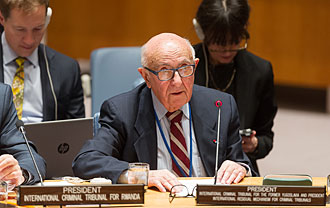President Meron updates the UN Security Council on the completion strategy

The Tribunal’s President, Judge Theodor Meron, today updated the United Nations Security Council on the progress being made by the ICTY towards the completion of its mandate.
The President began his address by updating the Security Council on the status of the ICTY’s remaining trials and appeals. He pointed out that in 2014 the Appeals Chamber rendered two judgements, and another was expected in January 2015 for the multi-accused Popović et al. case. The President underscored that while there would be four trials and five appeal cases remaining as of the beginning of 2015, by the end of the year the number was expected to decrease to one trial and one appeal judgement outstanding.
In addition, the President explained that even though the Tribunal’s work is progressing well, certain trial and appeal judgements would be rendered later than previously reported. For example, he noted that the judgement for Ratko Mladić could now be expected in March 2017 or later. This was due to the reopening of the prosecution’s case and the trial now sitting four days a week. He reassured the Council that these changes in judgement forecasts were not expected to impact the Tribunal’s closure in 2017.
President Meron then turned his attention to two challenges that the Tribunal is facing in completing its work: detainees’ health and the retention of Tribunal staff. In relation to the poor health of certain detainees, he observed that the Goran Hadzić trial was currently in adjournment and the Ratko Mladić case was sitting on a reduced trial schedule, both per medical advice. The President also noted that Vojislav Šešelj is currently on provisional release due to his poor health.
President Meron further explained that “health-related issues are an unavoidable concern and raise humanitarian questions. Although the Tribunal makes every effort to ensure appropriate medical care, developments related to the health of detainees can sometimes fall outside our control and, as I am sure the Council understands, can cause delays to the Tribunal’s work.”
The President also expressed his concern about staff retention and its potential to affect the Tribunal’s judgement delivery schedule. He noted that “[d]espite staff members’ dedication to their cases and duties, many of them are searching for other employment—and where offers cannot be deferred, they are leaving the Tribunal, depriving us of valuable institutional and case-specific knowledge.”
While acknowledging the operational focus of his report, the President expressed his hopes that “…the nature of these briefings will not lead any of us to forget the bigger picture and the tremendously significant role that the ICTY has played, and continues to play, both in setting global standards for international criminal law and justice and in helping to strengthen the rule of law at the local level.”
The President concluded his address by thanking the members of the Security Council for their continued support and commitment. He underscored that “…the ICTY, the Mechanism, and other international tribunals have served and continue to serve as the concrete manifestation of a commitment to ending impunity”.

